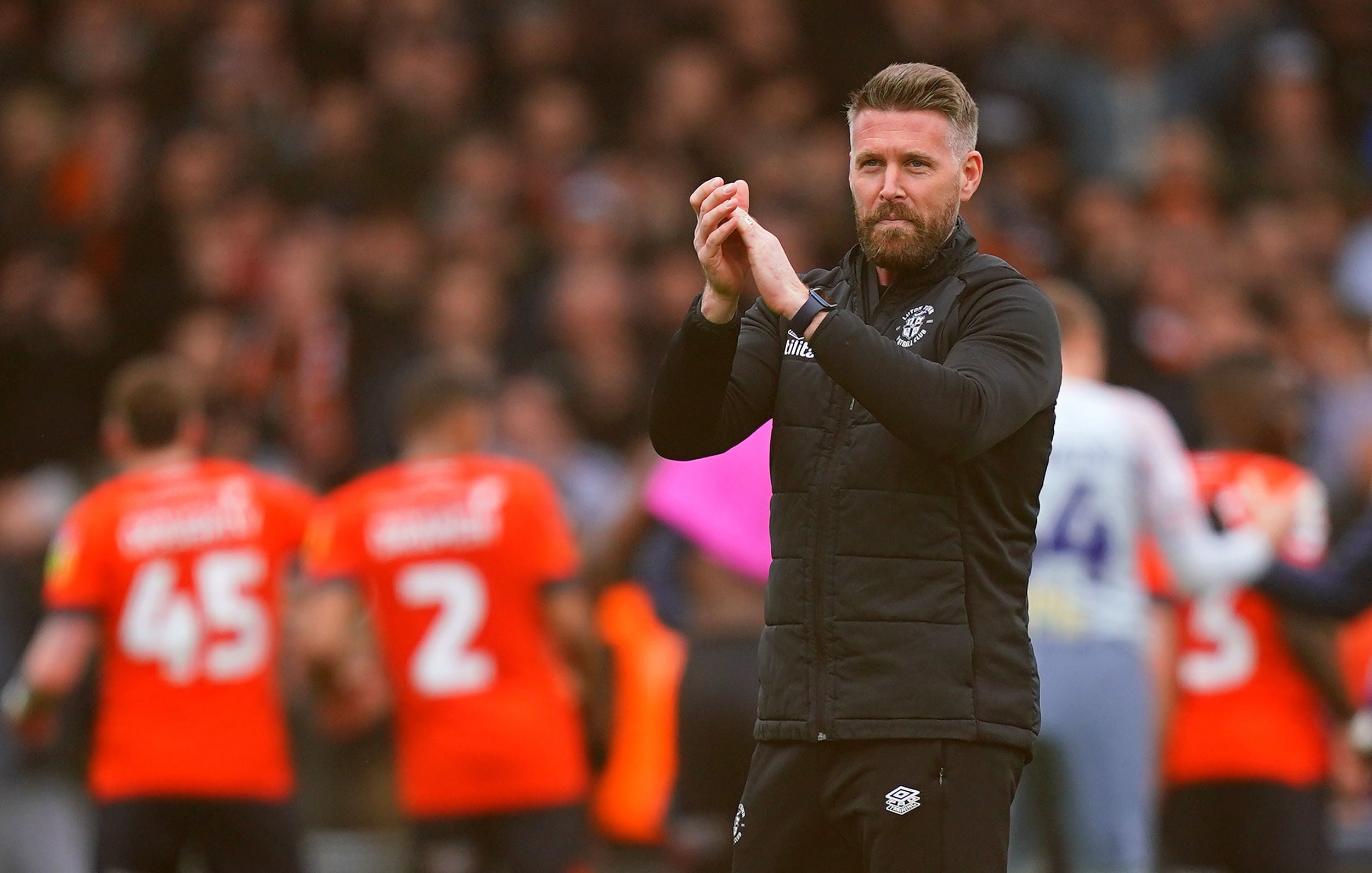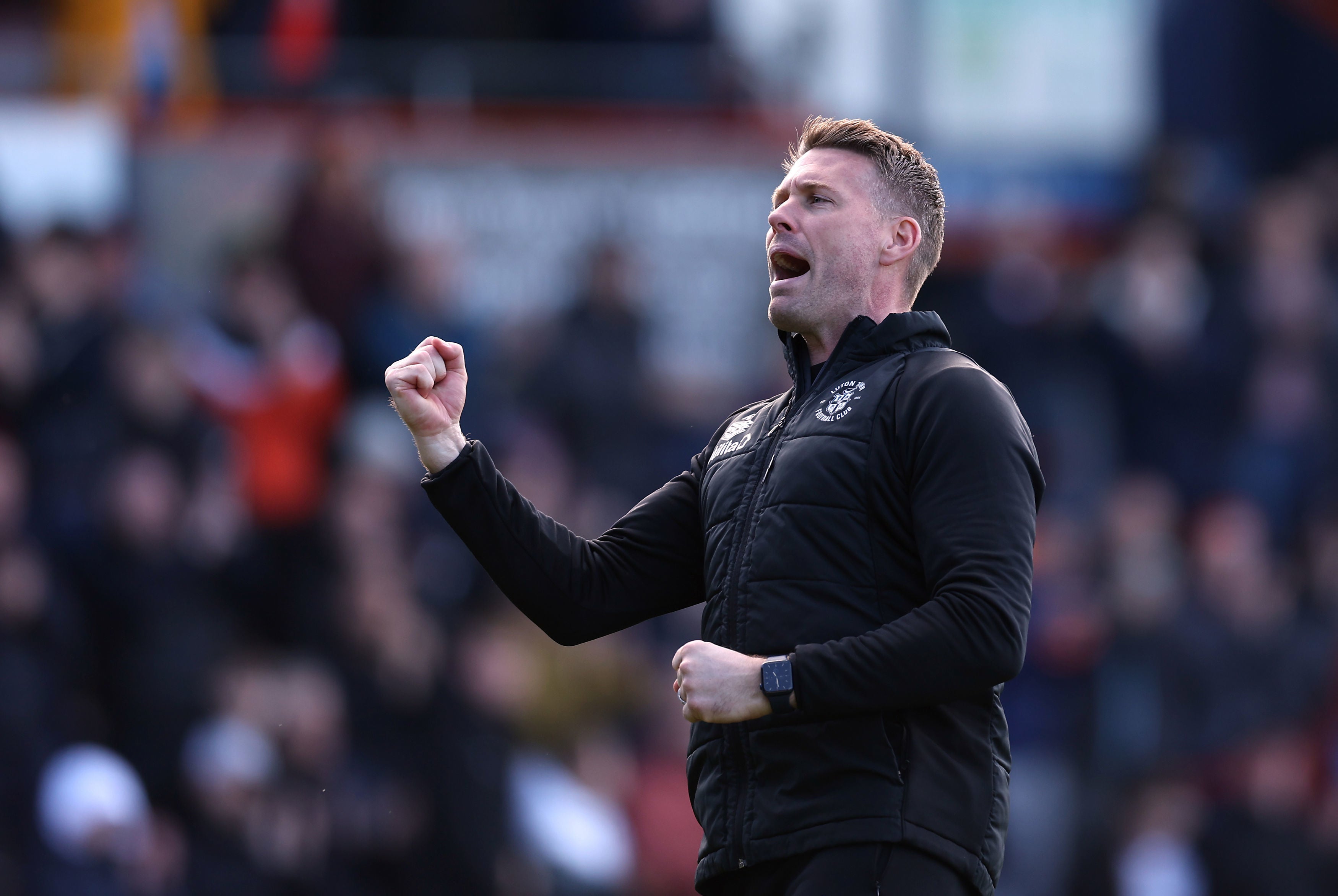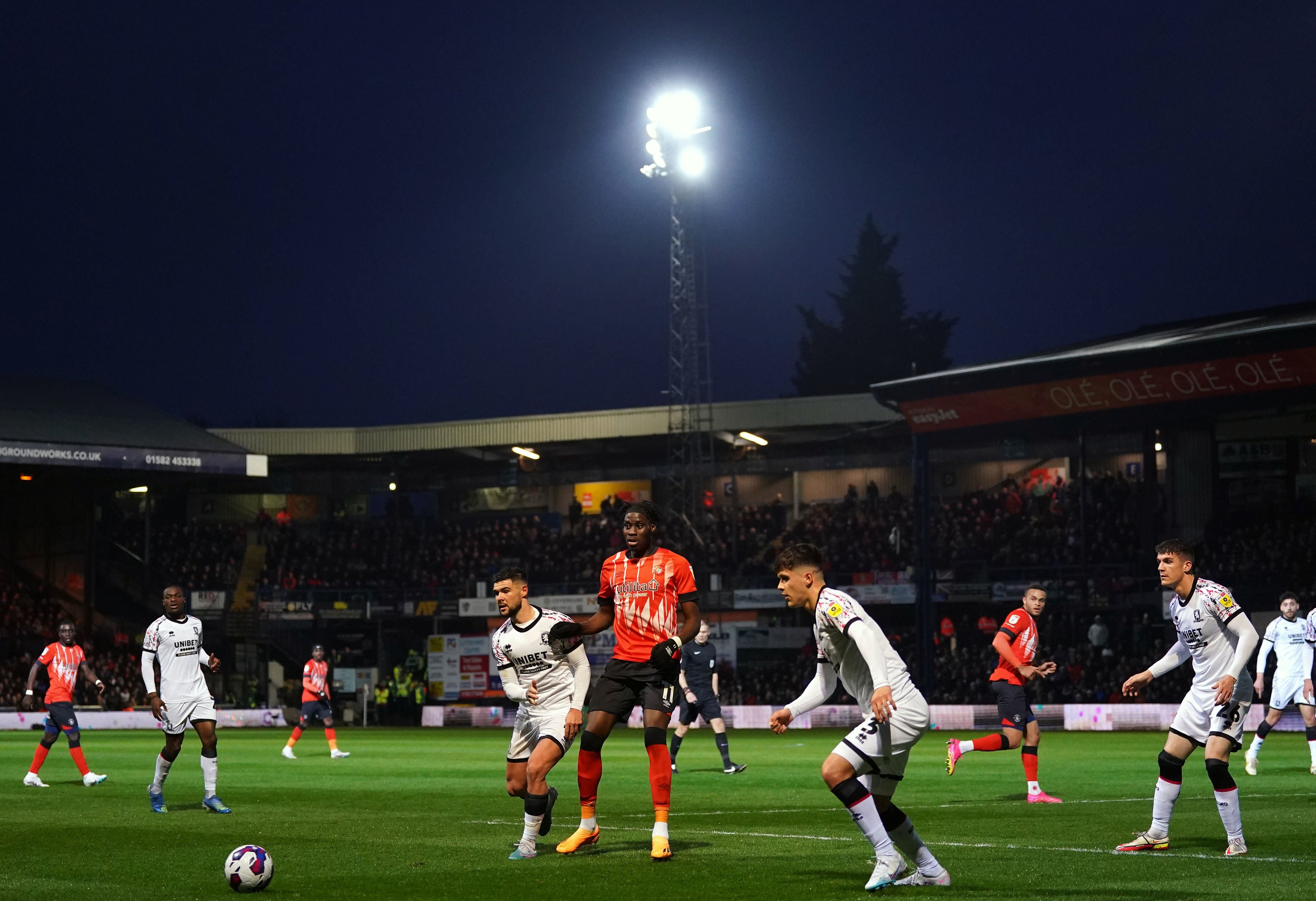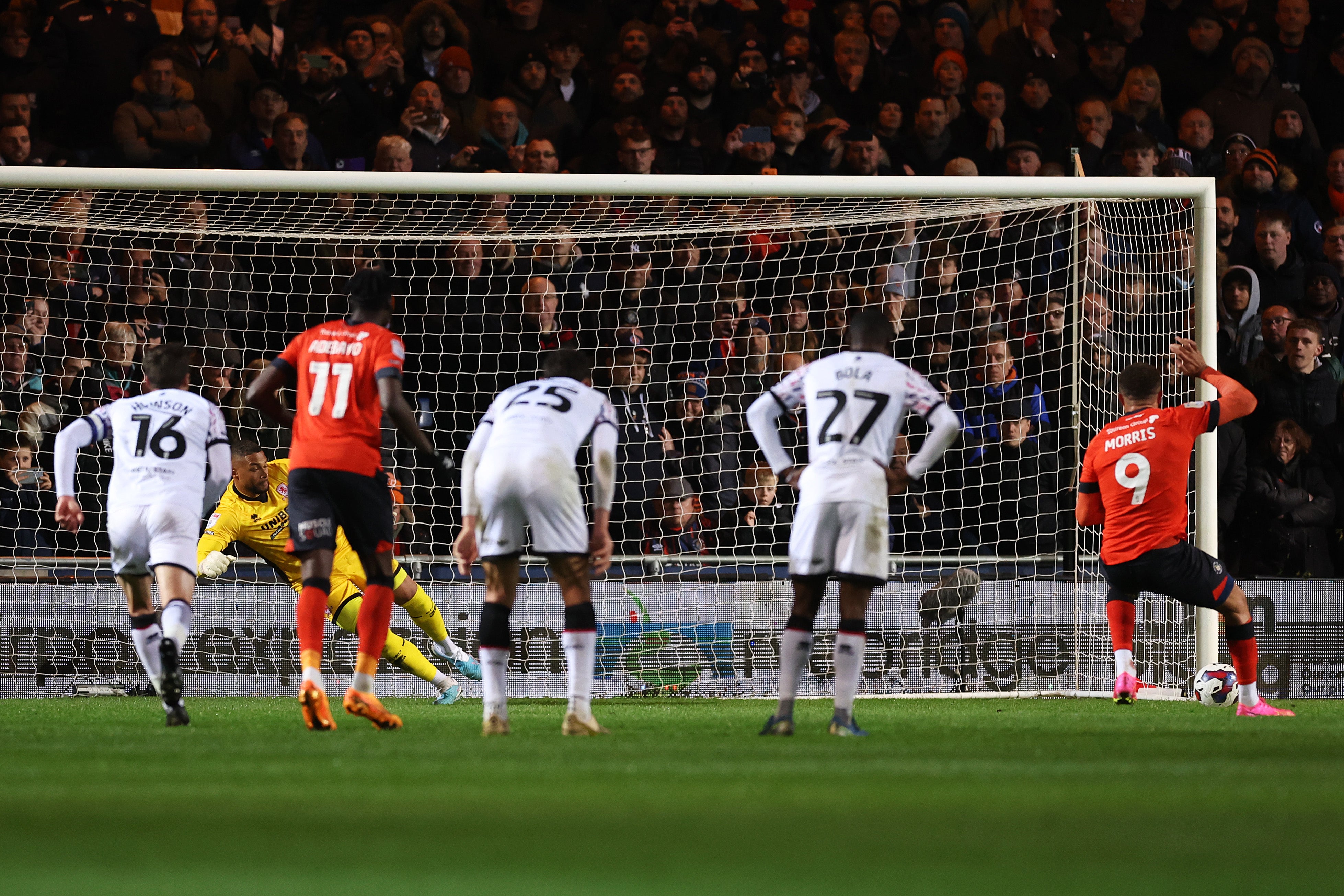A tiny ground and a squad costing less than a Man City sub. So how are Luton within reach of the Premier League?
A club with a long history of punching above their weight are daring to prove you don’t need money to make it to the Premier League, writes Lawrence Ostlere at Kenilworth Road


An hour before kick-off in their league showdown with play-off rivals Middlesbrough, Luton Town’s club shop is teeming. The little building perched outside Kenilworth Road is like a temporary prefab classroom and inside it’s cosy: once you’ve bought a shirt or a mug or a woolly hat then you best be on your way to make room for someone else.
It is a different world to the extravagance of the Premier League. Tottenham, for example, boast the largest club shop in Europe: half an acre of sheer Spursy-ness, selling everything from Spurs-encrusted party bowls to the Spurs Monopoly board game, complete with a 100-seat auditorium to consume even more Spurs from the comfort of a soft chair. These two clubs seem to exist on different planets, and yet they could well be rivals in the same league next season.
Luton have climbed here by consistently punching above their weight. The club’s entire wage budget, around £6m, would afford one Manchester City sub. They are always swimming against the tide and the small but mighty Kenilworth Road is a monument to that – intimate and intense, like a particularly atmospheric cow shed, with 10,000 seats that sound like 50,000 when the linesman fails to spot a foul throw.
Luton’s long-awaited move to a new venue at Power Court is still a couple of years away. So should they win promotion, what on earth will the Premier League giants make of a ground where away fans file through an alleyway and up a metal staircase that hangs over neighbouring gardens? “They will think it’s a tip,” smiles Alex, a Luton season-ticket holder in the club shop. He has been coming here since 2005, sitting in the same seat since he was three years old. “But it’s our tip.”
***
Despite his reputation as one of the brightest managers in the Football League, Rob Edwards was expecting some hate from Luton fans when he took charge in November. He had only recently left Watford, their bitter rivals, and so when he sat down for his first press conference as the new man in charge of Luton Town, all he could do was try to defuse a potentially volatile situation. “It’s not as if I left Watford a club legend,” he joked.
Edwards was referring to the way he was spat back out by Watford after only 11 games, a familiar story for managers who dare work for the trigger-happy Pozzo family. But far from holding a grudge, Luton fans seemed to get a kick out of sticking one to their rivals. “Welcome Rob,” read a banner at his first game away at Middlesbrough, which soothed some anxiety. His first home game at Kenilworth Road, a Boxing Day win over Norwich City, finished with the entire ground singing his name.

It would prove to be the first win of many with only two league defeats since, to leave Luton third in the Championship and into the play-offs for the second successive season. A club with a tight-knit staff and limited funds have improved their league position every year for eight in a row, climbing from the Conference in 2014 to the upper echelons of the Championship, and now they are within touching distance of the top tier for the first time in 30 years.
At the heart of their rise is continuity – midfielder Pelly Ruddock Mpanzu has been with the club from non-league – and careful planning. Losing manager Nathan Jones to Southampton was a sudden bruise, but Edwards was already on the radar. Luton had analysed his League Two-winning year in charge of Forest Green Rovers and found it was no fluke – the underlying numbers showed a manager deploying the kind of fast, aggressive football that Luton themselves used to dominate Leagues One and Two. They analysed his 11 games at Watford too, and discovered some good things in the team Edwards was building, despite the quick sacking.
Preparation has been key in the transfer market too. Led by club legend Mick Harford, chief scout Phil Chapple and analyst Jay Socik, Luton have made a habit of identifying smart signings from across the Football League and some inspired loans from the Premier League too. Right-back James Bree left the club in January but Luton seamlessly replaced him with Cody Drameh on loan from Leeds, and the addition of Aston Villa’s Marvelous Nakamba has brought solidity in midfield. Buying Carlton Morris from Barnsley last summer was crucial, and he has racked up a career-best 20 league goals.

They recruit a specific Luton type: as well as being technically sound and a good character, they have to be athletic, able to withstand a high tempo for 90 minutes and out-run their opposition. After all, this is what Luton are: a club who extract every last drop from whatever they have. No Championship side have won more tackles in the final third than Luton this season, and the result is a team that are often hard and horrible to play against.
Edwards has found a balance between a pragmatic approach and a team who can play football too. A direct route to goal is always an option with the power and strength of Morris and the imposing Elijah Adebayo up front, and Luton have found they don’t need to dominate possession to win games. That might be a useful trait in the Premier League.
But what really stands out is how Luton are run off the pitch. There is no billionaire benefactor here: the club were saved by their own fans and now they are supporter-owned, and the people in charge – chief executive Gary Sweet, chairman David Wilkinson and majority stakeholder Paul Ballantyne – are deeply invested in its future. As one member of staff told The Independent this week: “Our owners give a s**t, and that isn’t always the case in football.”
***
One staff member, Bill Cole, has worked for Luton for five years and has been visiting Kenilworth Road for 76. He will miss it, but he won’t shed a tear when it’s gone. He reels off more than half a century’s worth of new stadium plans that ended in disappointment, and says Power Court is exactly what the club has been crying out for, for far too long. “I hope they build a metal pillar in front of the press box to remind us of The Kenny,” he smiles.
Behind the pillar an entertaining game plays out between two teams equipped to compete with the lower rungs of the top flight. Luton are caught on the counter and Middlesbrough go ahead, but the second half is different. Tom Lockyer heads home an equaliser and the stadium comes alive. Morris goes down under what looks like light contact from a rash goalkeeper’s challenge, and slides home the penalty to win the game 2-1.

At full-time, buoyant Luton fans pour out into the narrow streets that run down the hill to town. Luton will almost certainly finish third now, and Boro fourth, and if these two sides are to contest the play-off final – the so-called richest game in football – then perhaps this win has set the tone. Cole has seen it all before, though, and he has a warning. “In 1959 we played Nottingham Forest in the FA Cup final,” he remembers. “Two weeks earlier we’d played them here at Kenilworth Road and we stuffed them 4-0. But at Wembley, we never showed up.”
But win or lose the play-offs, Luton are unlikely to change too much. They are going in the right direction and their progress is a result not of vast investment but of sound stewardship. Amid the game’s financial bonanza benefiting a few elite clubs, Luton are showing that there is still a place for a little meritocracy in football.
Join our commenting forum
Join thought-provoking conversations, follow other Independent readers and see their replies
Comments